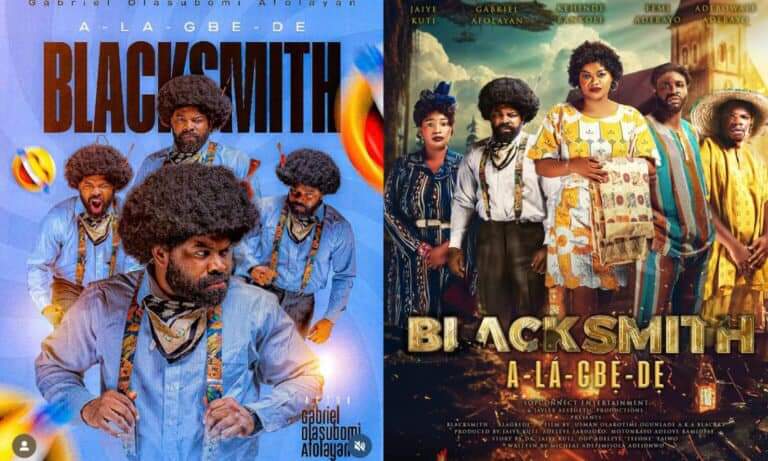MOVIE REVIEW: In Blacksmith (Alagbede), Femi Adebayo, Kehinde Bankole redefine Nollywood romantic comedy genre
Movie Title: Blacksmith (Blacksmith (Alagbede))

Release Date: 19 April, 2024
Runtime: 1 hour, 30 minutes
Director: Ogunlade “BLACKKY” Usman
Cast: Femi Adebayo, Kehinde Bankole, Gabriel Olasubomi Afolayan, Adebowale Adebayo, Bimbo Oshin, Jaiye Kuti, Mr Macaroni, Taiwo Ibikunle
Based on the Nollywood films released in 2024, it’s appropriate to ponder an early question: “Is storytelling in Nigerian films regressing or progressing?”
Using “Blacksmith (Alagbede),” a film directed by Shina Peters, as a yardstick, it is safe to say that we are making progress. Blacksmith (Alagbede) is not your typical Yoruba film. It offers a more nuanced plot, excellent casting choices, costumes that are true to the period it was set in, and an uncommon feature you barely find in Nollywood films: good writing.
As implied in its name, Blacksmith (Alagbede) tells the story of a blacksmith hopelessly in love with a girl. This pushes him to make a drastic decision that threatens his reputation, friendship, and, ultimately, his life.
While Blacksmith (Alagbede) has the potential to be one of the best Nollywood romantic comedy films of 2024 and receive several award nominations, the film’s concept can best be described as simple. The storyline was quite linear, allowing easy prediction of its final events.
The Plot
Blacksmith (Alagbede) starts with a party where we see Adio dancing with his friends. His girlfriend, Omolewa, soon joins him. Tension rises when Omolewa catches the eye of a rich man, and Adio and his friends are discriminated against due to their low economic status. A fight soon breaks out, with everyone hurriedly dispersing into the night.
This event causes Wole, Adio’s friend, to become bitter as he begins to rant about how he and his friend are poor and treated in a certain way. Content with his life, Adio tries to dismiss his friend’s sentiments. However, he discovers they are true when Omolewa’s mum forbids her from seeing Adio, coercing her to accept the rich man as her husband.
Desperate to get rich, Adio visits a herbalist who tells him he has to offer a human life in exchange for wealth. This does not sit well with him, so he visits another herbalist who says he doesn’t need to provide a human sacrifice as there are alternatives. He gives Adio a set of instructions, warning that he must perform the tasks every day. The instructions range from not breathing around women at a particular time to bathing in the open.
True to the herbalist’s words, Adio becomes rich after performing such tasks. Unfortunately, his wealth calls for suspicion. Omolewa questions his source of wealth, to which he lies that Wole recently inherited a considerable sum of money from his grandfather and shared a bit of it with him.
Due to the nature of his task, Adio begins to act erratically, raising more eyebrows. After hearing each other’s stories, the community concludes that he performed money rituals. This revelation threatens everything Adio holds dear to his life: his friendship with Wole, his passion for being a blacksmith, his reputation, and, most importantly, Omolewa, the sole reason for his actions.
The Good
Blacksmith (Alagbede) is a period drama with good execution. Barely thirty minutes into the romantic comedy, you can tell a lot of thought went into each scene. The setting was phenomenal. The location manager and production designer worked well in taking viewers back to the ’90s with the cars, houses, and technological tools like black-and-white TV that existed then.
The costumes also hit the mark. Nollywood period films often fall victim to exaggerating the type of clothing worn in that era. Luckily, the costume designer did the proper research and created a wardrobe that reflected the personalities of each character while staying true to the era.
Storytelling is a central part of every project. The producers of Blacksmith (Alagbede) knew this very well, so they invested effort in the script. The way the events unfolded in the film engaged viewers. We follow Adio’s journey from being a poor man with peace of mind to a rich man with a target on his back. We see how his situation changes him and how he relates to the people around him. There were also no “filler” scenes, as each scene moved the story forward.
The dialogues in Blacksmith (Alagbede) are well written, with the right amount of wit and grammatical prowess.
Lastly, Blacksmith (Alagbede) is an example of what good casting looks like. Every actor, including extras, delivered unforgettable performances. Femi Adebayo won our hearts with his kindness as Adio, Kehinde Bankole once again proved her range as Omolewa, Jaiye Kuti made us fall more in love with her wittiness as Iya Aja, and Gabriel Afolayan allowed us to properly hate Wole without feeling guilt.
The Bad
A significant flaw of Blacksmith (Alagbede) is its linearity. While it provides a relatively fresh perspective on a familiar story, the plot seems too easy. Apart from the revelation at the film’s end, Blacksmith (Alagbede) lacks enough twists and turns to keep viewers on the edge of their seats, thus causing a vital element of predictability.
Final Verdict
9/10. Despite the lack of suspense, Blacksmith (Alagbede) is a Nollywood film that will make you laugh, cry, and be jealous when you watch how far Adio is willing to go for Omolewa.
Blacksmith (Alagbede) is now showing in cinemas near you.




